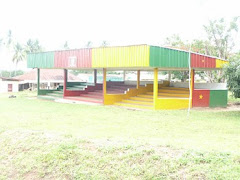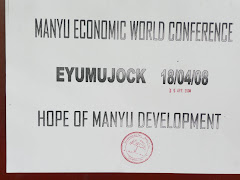+of+joeplace.JPG) Advocates for Manyu Economic Revival:
Advocates for Manyu Economic Revival:
It is not enough to question what Manyu has done for you. We must ask, what have we contributed to the well being and development of Manyu? How much are we giving back or investing? It is only Manyuans who can advocate for their own development. Without a doubt, strangers will not do it for us.
During visits from abroad some of us embark in Limbe, Douala and Yaoundé without ever visiting our towns and villages of origin. How do you develop a place you don’t even know? The portrayal of our division amongst us in the Diaspora has not always been positive. We fail to motivate and instead paint a picture of a division that remains under-developed and in neglect. We talk of Mamfe without a single petrol station, township taxis, decent hotels and restaurants.
The German bridge Mamfe:
 It is alright to discuss all our ills, but fail to ask what we have done to produce a cure. Isn’t time we challenge ourselves to a higher order for the economic progression of Manyu? Besides, we have stakes as the educated and well financed class. Now is the time for the Diaspora to advocate for the economic rebirth of the division.
It is alright to discuss all our ills, but fail to ask what we have done to produce a cure. Isn’t time we challenge ourselves to a higher order for the economic progression of Manyu? Besides, we have stakes as the educated and well financed class. Now is the time for the Diaspora to advocate for the economic rebirth of the division.
Market in Mamfe:

A Vibrant private sector:
The Diaspora has a chance to strengthen the private sector in Manyu. The existence of a vibrant private sector with warehouses, IT and industrial training centers, to cater for a 21st century workforce, shops, banks, private schools etc will benefit the masses and economy, creating jobs and employment. By us playing an active role, small businesses will operate on the basis of wealth, ideas and skills learned from the Diaspora, thus facilitating the transfer of technology and sound business practices.
In the old days, our parents cultivated and opened small size farms for food consumption. Manyu has plenty of vast forest land for us to implement industrial farm practices, cultivating hectares of farmland for palms, cocoa, coffee, and cash crops such as cassava, plantains. What about snail and fish farming, a sector with a ready market that fetches quick returns.
Tinapa - free trade zone Calabar:
 Legal Cross Border Trade:
Legal Cross Border Trade: Although trade is often cited as the best solution to Africa’s problems, the irony is, many countries find difficulties trading formally with each other. Custom duties, tariffs and other barriers tend to hinder intra-country trade.
For many years, informal cross border trade between Manyu and Nigeria has manifested an inseparable economic link of the communities living along the borders. The tarring of the Ekok – Mamfe road will hence open doors for formal trading. The Diaspora can infuse capital by setting up warehouses in Mamfe. These storage facilities will be a replica of “John Holt”, and serve as distribution points for wholesale trading and employment.
Furthermore, Manyu benefits from Tinapa in Calabar, the premier Africa business and leisure resort free trade zone. Tinapa is the Dubai of Africa and no other free trade zone offers similar services in the West/Central African region. Manyu also has a dynamic opportunity to ensure food security by availing markets for its agricultural products. Large markets are good incentives for our farmers to produce more. The Manyu Diaspora can play an active role in this sector through partnerships and joint ventures.
Infrastructure development:
Many of us own and live in decent housing abroad. However, when we return home to visit, we end up in hotels or put up with friends. One simple and obvious reason is because the infrastructures we left behind are no longer comfortable and lack basic amenities.
A few years ago, former Minister of Environment Chief Clarkson Mbianyor challenged every Manyu elite to build a house in their division of origin. The idea of owning a piece of property in Manyu is meant to help us strengthen ties with our families and division. Besides being a lifelong investment, it encourages us to make frequent visits as custodians instead of passive observers in our own land of birth. There is no better pride for a Manyu person than a simple investment of owning a piece of his own property. “Show me your house, show me your farm, or better let us die in our poverty” (Clarkson Mbianyor).
All it takes is for us to engage a Nigerian or Ghanaian in a conversation and he will tell you of his investments back home. We can definitely acquire knowledge about community development from these people. The Manyu Diaspora can help boost the economy by embarking on infrastructure development projects which employ our youths and spur economic activities. If ten Diasporas per year were to invest in building construction, the net gain for the Manyu economy will be less unemployment, increased commerce and wealth distribution. Every sector of the economy will benefit as well as the investor, and even in Manyu real estate do appreciate in value over the long term.
Manyu rain forest - idle for large scale agriculture plantations:
 The Diaspora needs to assist in the establishment of small and medium enterprises (SME) and engage in large scale agriculture production to accelerate economic achievement. There is no doubt the Diaspora can contribute their quota and make an impact.
The Diaspora needs to assist in the establishment of small and medium enterprises (SME) and engage in large scale agriculture production to accelerate economic achievement. There is no doubt the Diaspora can contribute their quota and make an impact.
What Manyu needs is development and empowerment at all levels. No single person, group or organization has a monopoly of ideas or policies that can lead to Manyu’s economic evolution. It is therefore apparent we need an inclusive strategy and not one that is exclusive. We need a development strategy founded on the ideals that unite us and core principles that can uplift our people and economy. Because there is so much that unites than divides us, we have to confront new ways of doing things. To achieve this, we have to be creative and be challenged to contribute our quota. Manyu is our pride, to help develop it; we must therefore have a shift in mindsets and not only follow but act, guide and lead.
About the writer:
Simon Etta has been an active member of MECA Washington since 1989 and served as chapter President. He strongly supports the activities of MEDWC and manages its blog and website (http://www.medwc.org/) during his spare time. Mr. Etta is a telecommunication executive; he lives and works in Baltimore, Maryland. He can be reached by email: ecotelusa2002@yahoo.com





































